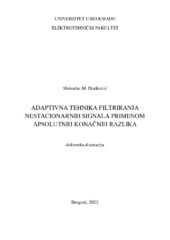Prikaz osnovnih podataka o disertaciji
Adaptivna tehnika filtriranja nestacionarnih signala primenom apsolutnih konačnih razlika
Adaptive filtering of non-stationary signals based on absolute finite differences
| dc.contributor.advisor | Đurović, Željko | |
| dc.contributor.other | Kvaščev, Goran | |
| dc.contributor.other | Perić, Zoran | |
| dc.contributor.other | Nikolić, Boško D. | |
| dc.contributor.other | Ćertić, Jelena | |
| dc.creator | Drašković, Slobodan | |
| dc.date.accessioned | 2024-01-17T15:56:07Z | |
| dc.date.available | 2024-01-17T15:56:07Z | |
| dc.date.issued | 2023-06-28 | |
| dc.identifier.uri | https://eteze.bg.ac.rs/application/showtheses?thesesId=9488 | |
| dc.identifier.uri | https://fedorabg.bg.ac.rs/fedora/get/o:32363/bdef:Content/download | |
| dc.identifier.uri | https://plus.cobiss.net/cobiss/sr/sr/bib/134243081 | |
| dc.identifier.uri | https://nardus.mpn.gov.rs/handle/123456789/22074 | |
| dc.description.abstract | Iako je oblast adaptivnog filtriranja razvijena i različiti rezultati datiraju još iz sredine prošlog veka, činjenica da i danas postoje naučni časopisi i međunarodne naučne konferencije koje su posvećene samo ovoj oblasti dovoljno govori o tome koliko je ona i danas aktuelna i izazovna za čitave zajednice naučnika i istraživača. Nijedan od algoritama se ne može opisati kao optimalan, već su određeni algoritmi bolji za određene klase modela, ili su dobri u detekciji promena stacionarnosti i estimaciji u prelaznom režimu, dok u stacionarnom stanju daju osetno veću grešku, i obratno. Takođe, različiti algoritmi imaju različit broj parametara koje treba podesiti pre početka estimacije i koji u mnogome utiču na kvalitet estimacije. Uzimajući u obzir sve te kriterijume, postaje jasno da ne postoji optimalan algoritam. Svi algoritmi imaju određene nedostatke i prednosti u zavisnosti od područja upotrebe. Predmet istraživanja ove doktorske disertacije su algoritmi za detekciju nestacionarnosti i adaptaciju faktora zaboravljanja. Cilj disertacije je razvoj novog algoritma za detekciju nestacionarnosti signala i adaptaciju faktora zaboravljanja, sa uporedivim ili boljim performansama u poređenju sa prethodno opisanim i u literaturi poznatim algoritmima. Rešenje predloženo u ovoj disertaciji predstavlja novi pristup dizajnu algoritma za detekciju nestacionarnosti signala i adaptaciji faktora zaboravljanja zasnovan na apsolutnim konačnim razlikama koji do sada nije korišćen u literaturi. Predloženi algoritam je intuitivan i jednostavan za korišćenje i implementaciju u praksi. Eksperimentalni rezultati pokazuju odlične performanse algoritma u odnosu na druge, trenutno dostupne algoritme. | sr |
| dc.description.abstract | Although the field of adaptive filtering is quite developed and various results date back to the middle of the last century, the fact that even today there are scientific journals and international scientific conferences that are dedicated only to this field speaks volumes about how current and challenging it is even today for entire communities of scientists and researchers. None of the algorithms can be described as optimal, but certain algorithms are better for certain classes of models, or they are good at detecting changes in stationarity and estimation in the transient mode, while in the stationary state they give a noticeably larger error, and vice versa. Also, different algorithms have a different number of parameters that need to be set before starting the estimation and which largely affect the estimation quality. Taking into account all these criteria, it becomes clear that there is no optimal algorithm. All algorithms have certain disadvantages and advantages, depending on the area of use. The subject of research in this doctoral dissertation is algorithms for non-stationarity detection and adaptation of the forgetting factor. The goal of this doctoral dissertation is the development of a new algorithm for the detection of signal non-stationarity and the adaptation of the forgetting factor, with comparable or better performance compared to previously described and known algorithms in the literature. The solution proposed in this dissertation represents a new approach to the design of the algorithm for the detection of signal non-stationarity and the adaptation of the forgetting factor based on absolute finite differences, which has not been used in the literature so far. The proposed algorithm is intuitive and easy to use and implement in practice. Experimental results show excellent performance of the algorithm compared to other currently available algorithms. | en |
| dc.format | application/pdf | |
| dc.language | sr | |
| dc.publisher | Универзитет у Београду, Електротехнички факултет | sr |
| dc.rights | openAccess | en |
| dc.rights.uri | https://creativecommons.org/licenses/by-nc-nd/4.0/ | |
| dc.source | Универзитет у Београду | sr |
| dc.subject | Adaptivno filtriranje; Detekcija nestacionarnosti; Apsolutne konačne razlike, Varijabilni faktor zaboravljanja; Modeliranje signala | sr |
| dc.subject | Adaptive filters; Non-stationarity detection; Absolute finite differences; Variable forgetting factor; Signal modeling | en |
| dc.title | Adaptivna tehnika filtriranja nestacionarnih signala primenom apsolutnih konačnih razlika | sr |
| dc.title.alternative | Adaptive filtering of non-stationary signals based on absolute finite differences | en |
| dc.type | doctoralThesis | |
| dc.rights.license | BY-NC-ND | |
| dc.identifier.fulltext | http://nardus.mpn.gov.rs/bitstream/id/158513/Disertacija_14729.pdf | |
| dc.identifier.fulltext | http://nardus.mpn.gov.rs/bitstream/id/158514/Izvestaj_Komisije_14729.pdf | |
| dc.identifier.rcub | https://hdl.handle.net/21.15107/rcub_nardus_22074 |



